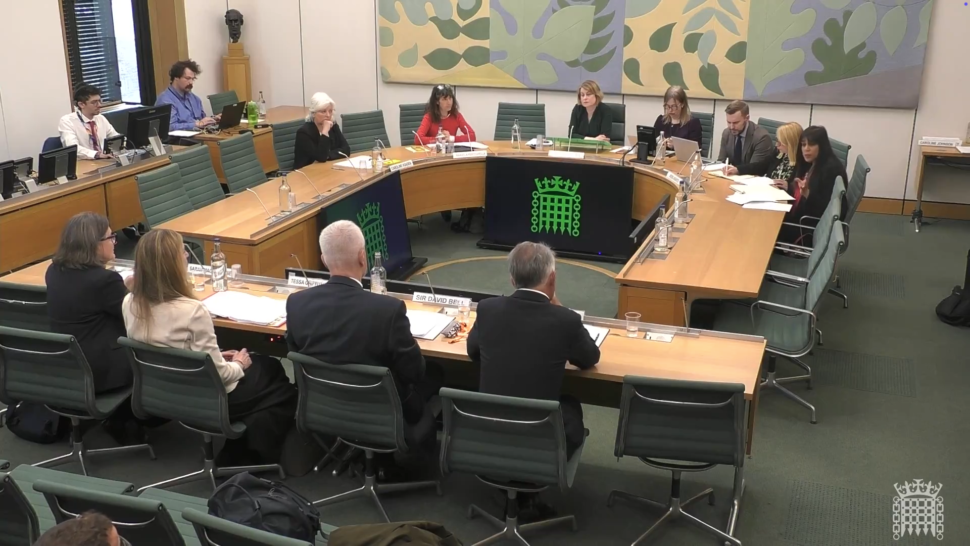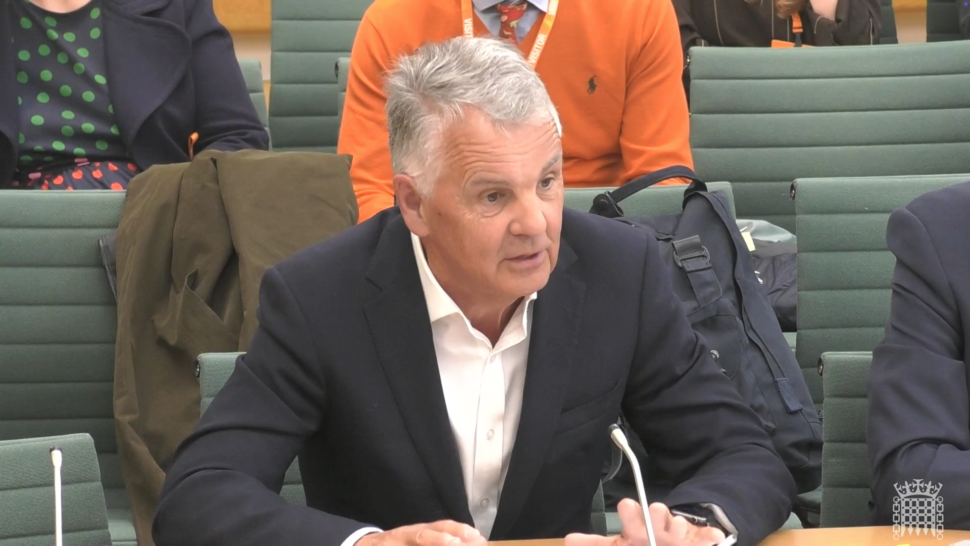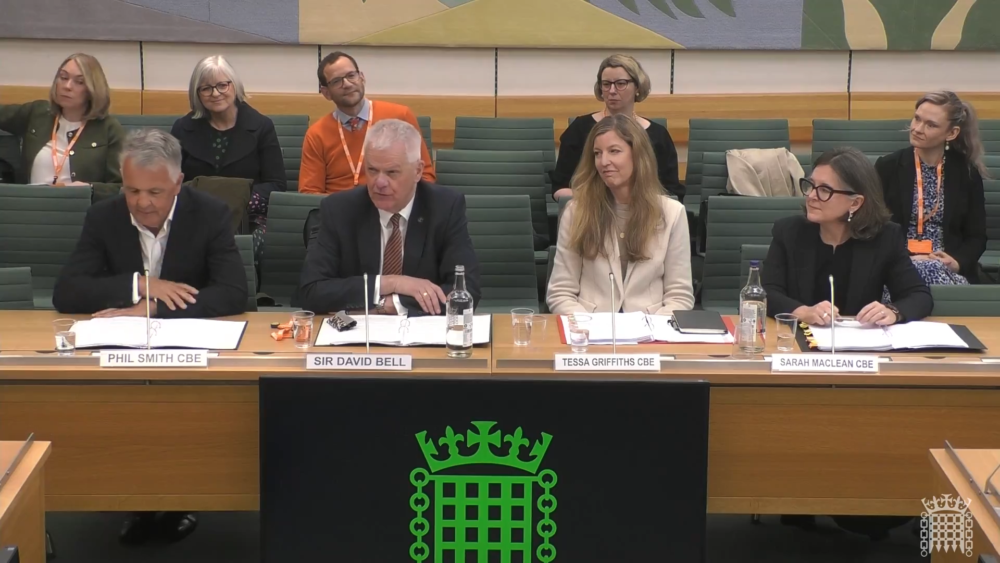Skills England bosses have defended their independence from government but dodged questions about whether they will challenge under-funding of training and apprenticeships.
As part of its inquiry into FE, Parliament’s education select committee heard from the chiefs of new executive agency Skills England this morning on its work so far and its priorities once the Institute for Apprenticeships and Technical Education is abolished later this year.
Committee members grilled the agency’s chair Phil Smith, vice chair Sir David Bell, and joint CEOs Sarah Maclean and Tessa Griffiths.
The committee was told to expect the new executive agency to be fully up and running in the “next couple of months” and will announce who will make up its board imminently.
The inquiry was first opened in January, which sought to explore the current reforms and challenges in further education, has already heard from college principals, FE policy experts and economists.
Here were the key takeaways from Skills England’s leaders…
Don’t rely on Skills England to fight for resources
Committee chair Helen Hayes quizzed the panellists on what risks there are to Skills England operating as an executive agency, which means it will have “less operational independence” than the predecessor organisation, the Institute for Apprenticeships and Technical Education (IFATE).
Skills England chair Phil Smith said executive agencies are “powerful” whilst also having a “tie in” to the Department for Education.
“I think what we’re trying as much as possible to do is not to focus on barriers and obstacles, but to focus on opportunity,” he added.
Vice chair Sir David Bell, a former DfE permanent secretary, claimed that other executive agencies such as the Met Office, the Health Security Agency and the Forestry Commission “have a strong role to play” and that people are not “terribly consumed” by their constitutional status.
Later in the hearing, MP Mark Sewards pushed the panel to agree that FE was underfunded and outline how this would affect Skills England’s work.
Smith said it will provide Skills England the opportunity to “rally” the assets of “regional organisations” to respond to data-driven skills gaps.
“Clearly in today’s environment, we’re working within a particular envelope of funding, which is difficult,” he said.
Sewards continued to press the bosses on what representations of funding Skills England will make, but the panellists continued to avoid giving direct answers.
Maclean added that it was worth bearing in mind the decline in employer investment in training.
“Some of the things that can be friction in the system can be best solved by industry themselves, employers,” she said.

Hayes hammered the panel over the historic underfunding of FE and asked if Skills England has the operational independence to speak about resources issues within the skills sector, as “our evidence certainly says it really is”.
“Are you really saying that you’re not making any representations to the department or within the department at the moment in relation to the comprehensive spending review?” she asked.
Griffiths did not answer the question but instead said the quango’s role was to “very clearly” articulate where the skills gaps are.
Bell added that the executive agency will provide the “evidence base” for England’s skills requirements but it is up to ministers to make decisions on spending and resources.
Hayes pushed back that for Skills England to be successful, FE must work as “effectively” as possible, but in some parts of the country, colleges are “absolutely on their knees” because of prolonged underfunding.
Bell replied: “I think it is then during the spending review for ministers to determine what the priority should be, both within the department and across government as a whole but I think what we have done already is really powerful in providing that evidence, but I think the decisions quite rightly will fall out of the spending review.”
Crickets on level 7 apprenticeships decision
Committee members asked the panel for an update on its progress made of its “crucial role” in determining which training will be eligible for the new growth and skills levy.
Smith said Skills England received much feedback on modularisation and employer input.
He confirmed the body is informing the government “as much as possible” where the shortcomings are and where flexibility around the levy would create growth.
Co-CEO Tessa Griffiths pointed to last month’s announcement from DfE on pouring £600 million into construction training as a “blueprint” to work on government and industry working together to plug gaps.

Sarah Maclean, Skills England’s other co-CEO, added that the agency has heard from a number of stakeholders on how to shape decisions on apprenticeship standards, such as the PM’s announcement last year on shorter apprenticeships.
“We’ve heard a lot about some apprenticeship standards. Some apprenticeships may be too long, hence, shorter apprenticeships in some areas, some difficult to access, hence foundation apprenticeships in some areas,” she said.
But there was a marked silence on Labour’s policy proposal to move level 7 apprenticeships outside the scope of levy funding.
The controversial reforms were criticised by Ben Rowland, chief executive of AELP, who was questioned by the committee in a later session.
He said defunding level 7 apprenticeships was “unnecessary” but should be introduced gradually.
“Employers are upset enough at some of the changes that the government’s brought about in terms of [national insurance contribution] and upcoming employment legislation, so to suddenly pull the rug away with no time to adjust just doesn’t look like its very business savvy at all,” Rowland added.
Skills England will sell its ‘products’
Smith did acknowledge waning apprenticeship participation, saying he wants the system to be “holistic” and “easy to navigate”.
“I’m not just talking about apprenticeships; bootcamps and all the other things, T Levels and so on. How do they fit together? We’ve got to do a better job on that,” Smith said.
“’IfATE is essentially a product organisation,” he added. “It’s built great products and it’s maintaining those great products but it didn’t have any sales and marketing function. […] It would be crazy to have an organisation that made products and didn’t tell people why they should buy them.”
Skills England is expected to inherit IfATE’s responsibilities on developing standards for technical education and apprenticeships once it’s fully up and running. It also has a role in analysing data on skills shortages and training needs, and a convening role to bring together providers, unions and local governments. Running marketing campaigns is yet to appear in any official description of Skills England’s role.
Power at the top
Griffiths and Maclean were asked to respond to concerns their roles were too junior to have an impact.
Skills England’s CEOs are at the director-level civil service grade, reporting to Dfe’s director general for skills, Julia Kinniburgh. When the role was advertised, some argued it should have been a grade higher, director general, to have the heft to influence policy across government.
Both said they were privileged to be sharing the role and and pointed to other executive agency heads who are also placed at the director grade.
“It’s about impact, it’s about influence. The level of the CEO role is actually the same as in other executive agencies,” Maclean said.
She added: “It’s the same as the CEO of IfATE, for example. So we don’t see that as an issue, but I guess the proof will be in what we managed to deliver and how well we do that.”
Board appointments ‘ready’
Smith ended the session committing to return to the committee in the future and added that the Skills England long-awaited board is “ready to be announced”.
DfE advertised for Skills England board members last August but is yet to confirm who has been appointed.
They will be paid £10,000 to £15,000 per year and are expected to provide “independent perspective and insight” to the responsible minister, helping set key strategic objectives and identifying “high-quality feedback loops” between the government and skills bodies across the country.















Your thoughts